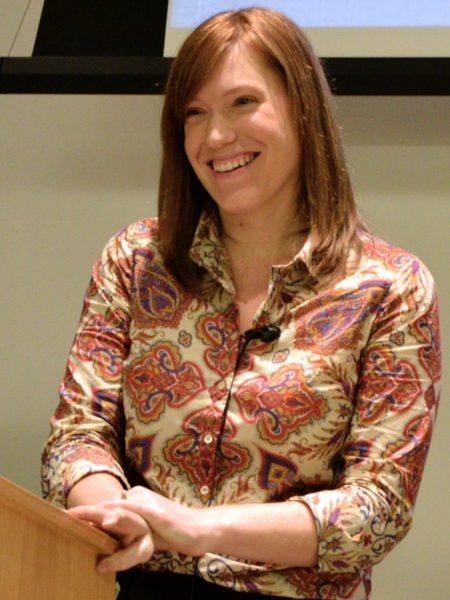 Dr. Frazier Benya, Senior Program Officer at the National Academies of Sciences, Engineering, and Medicine, spoke about her study on “Sexual Harassment of Women: Climate, Culture, and Consequences in Academic Sciences, Engineering, and Medicine” on Monday, August 26, at 2:15 p.m.
Dr. Frazier Benya, Senior Program Officer at the National Academies of Sciences, Engineering, and Medicine, spoke about her study on “Sexual Harassment of Women: Climate, Culture, and Consequences in Academic Sciences, Engineering, and Medicine” on Monday, August 26, at 2:15 p.m.
Abstract: The 2018 National Academy of Science report on Sexual Harassment of Women: Climate, Culture, and Consequences in the Academic Sciences, Engineering and Medicine revealed just how prevalent the sexual harassment of women is in STEM. The report demonstrated that 50% of women faculty and staff and 20-50% women students encounter or experience sexually harassing conduct in academia. It also detailed the effects of this harassment to the STEM community and provided guidance on what institutions can do to address and prevent sexual harassment in science. Study director for the Sexual Harassment report, Frazier Benya, PhD, will present on the report’s key findings and recommendations for implementing changes that can prevent sexual harassment and promote equity within scientific organizations and institutions.
Poster: The Iceberg of Sexual Harassment
Handout: Interventions for Preventing Sexual Harassment
Biography: Dr. Frazier Benya (she/her/hers) is a Senior Program Officer at the National Academies of Sciences, Engineering, and Medicine, and is a member of the staff supporting the Committee on Women in Science, Engineering, and Medicine (CWSEM), a standing committee of the National Academies. Currently, Dr. Benya serves as the Director of the Action Collaborative on Preventing Sexual Harassment in Higher Education. Recently, she served as the study director for the National Academies study “Sexual Harassment of Women: Climate, Culture, and Consequences in Academic Sciences, Engineering, and Medicine.” Dr. Benya’s work focuses on ensuring that science, engineering, and medicine are ethical and socially responsible, both in their practice and in who gets to participate in the work. Before joining the CWSEM staff, Dr. Benya worked with the National Academy of Engineering on improving and enhancing engineering ethics education and on analyzing the pathways engineers take from education to the workforce.
Dr. Benya holds a B.A with honors in Science, Technology and Society from the University of Puget Sound, and a M.A. in Bioethics and Ph.D. in History of Science, Technology, and Medicine from the University of Minnesota. Her Ph.D. focused on the history of bioethics and discussions of scientific social responsibility during the 1960s and 1970s, which led to the creation of the first federal bioethics commission in 1974. Her M.A. examined different types of institutional methodologies for considering the social implications of science with a focus on those that integrate scientific research with ethics research in the United States and Canada. Dr. Benya was elected a Fellow of the American Association for the Advancement of Sciences in 2017.
